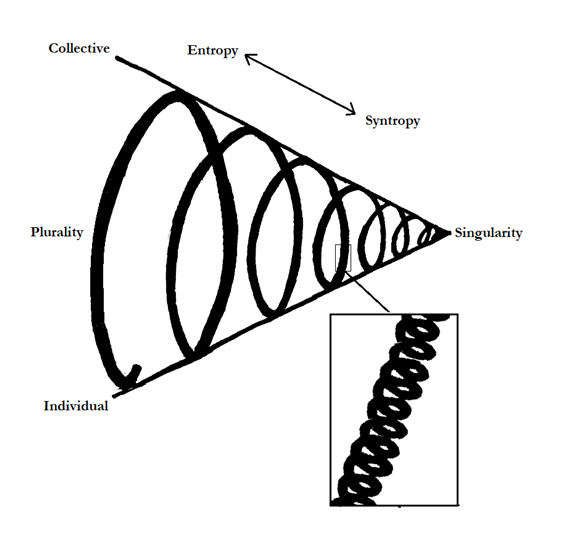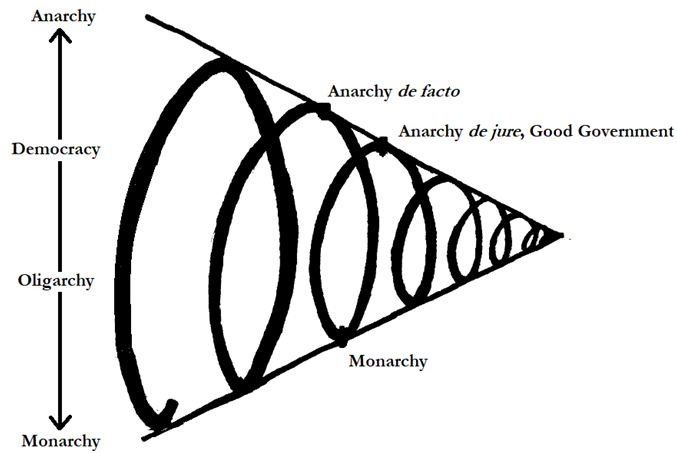Ambiarchy answers the question of why we live in a Universe that seems to contradict itself. In particular, how a single, shared Universe can produce various opposing results. This interests the Ambiarchist, because the Ambiarchist is interested in bridging the very harsh reality of the past with the realization of ideals in the future. Of special interest is how the Universe produces both statism and anarchy, which seem to contradict one another’s path.
Interesting enough, Ambiarchy finds that there is no contradiction in paths traveled by anarchy and statism, but that— counterintuitive as it may be— they are actually on the same path. This is the path of order. Order is produced through both government and non-government. The difference is merely how far along they are in the task.
Order finds itself to be a fundamental force in political economy by extension of its biological roots. Living systems—which compose political and economic systems—evolve, producing increasing order and complexity. Biological systems are negentropic or (imperfectly) syntropic systems.
What this means for political economy is that Nature has a preference built into her for increased order and complexity, and that those political and economic systems that best reflect her wishes will be the most likely to succeed. In the past, this has produced what we now understand to be unjust and bad forms of government. In the future, however, it will produce what we understand to be just, good government, or anarchy de jure.
In order to more clearly present the Ambiarchist (and actually, Ambitheist) position, I have developed a chart. This chart helps to explain the anacyclosis by way of spiral dynamics. Time is neither linear or circular, but both. It is spiraling.


The larger spirals are composed of spirals, too, such as how hours are composed of cycling minutes, and minutes are composed of cycling seconds, but the years appear to move on linearly, bringing change and novelty into our lives, a little more than repetition. Of course, the Universe itself cycles through Big Bangs and Big Crunches, and the appearance of linear existence is relative, and depends on the segmentation of this process. As we are not the whole, we experience segments. Nonetheless, our happiness is found in traversing the segment in a process of syntropy, because that is our purpose, and where meaning can be found in our lives. We are putting the Universe back together (and this explains its inherent need for an anthropic principle). Such a process demands increasing order, complexity, and unity, and rewards it. All attempts contrary are depressive failures.
As you can see, the apex of the spiral is a singularity, while the other end is an ongoing abyss. Living systems, being syntropic, find their satisfaction in approaching the singularity at a rate suitable to them. The singularity is associated with an absence of entropy and with maximal syntropy; that is, with the highest degree of order and complexity. It is, as Pierre Teilhard de Chardin put it, a complex unity. This is of interest to studies in political economy, because it means that political systems will continue to increase in their complexity, order, and unity. This is associated with emergence, ascendence, transcendence, etc.
But that is not all. So far, we have only covered the linear aspect of the spiral, which gives us a forward motion, or ascension. There is also a circular element to spirals, and these are interesting as well.
The circular element of the spiral brings the anacyclosis, or political cycle, to life. While the demand for increasing order reflects the linear progression of evolution in the spiral, circular time presents a dualistic expression of this demand, through poles of collective and individual. As linear time passes, circular time shifts in intensity between these two poles. This gives us political cycles.

Order increases for the individual at different rates than that of the collective, depending on the location within the spiral. In regard to political economy, monarchy was an increase in order, when compared to the anarchy de facto of hunter-gatherers, but it was an increase in order favoring the individual, in this case the king. However, anarchy de jure, good government, or Ambiarchy—as I synthesize the concepts— must be an increase in order as well, only this time in favor of the collective of humanity. All attempts to create anarchy in the other direction, such as by decreasing order, lead to misery and failure. We cannot go back in time. To do so would be entropic, and so deadly. Unfortunately, the mass of the anarchist milieu does not understand this, and still believes anarchy to be something which is not created, but which happens with the simple removal of the state and the creation of a power vacuum that will somehow be collectively but autonomously maintained. This simply does not work. It didn’t work for hunter-gatherers for the same reason: tragedy of the unorganized commons. We cannot go backward in time.
Back to Article Index